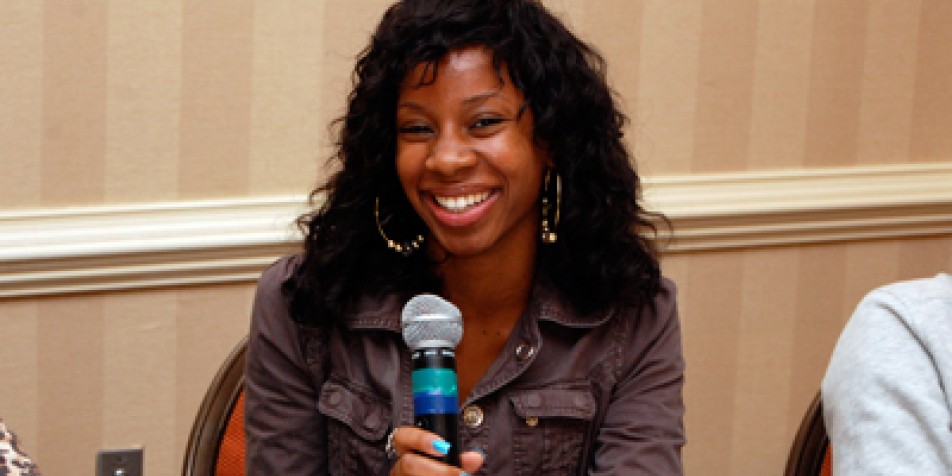Guest Blog: "For Me, Being a Teen Parent in the Child Welfare System Was Very Hard"

Samantha, pictured above at the 2012 Pennsylvania Council of Children, Youth and Family Services Conference, where, as a member of Juvenile Law Center's Youth Speakers Bureau, she had the opportunity to speak about her experiences in the child welfare system.
[Ed. note: This post is part of a series of blog posts Juvenile Law Center will be publishing during National Foster Care Month to call attention to issues facing foster youth who are aging out of the system.]
My name is Samantha and I entered care at two years old. I was put into foster care because my mom had a lot of kids and was also on drugs. All the first foster homes I was placed in were really bad because of the treatment that the foster parents gave me. I was in five foster homes, one group home, two treatment placements, and a Supervised Independent Living program (SIL). I aged out of care at 21 and am now living in a transitional housing program.
I had my son at 17 years old, so for me, being a teen parent in the child welfare system was very hard. I had a hard time learning how to love my baby. I was never nurtured as a child in the foster care system and loved so I had to learn this stuff. Being a mother to me is something I always wanted. When you grow up in the foster care system, something you always want for is family. Sometimes you just want to feel wanted. Having my son gave me a family and I always feel wanted.
I think that to help support and serve teen parents in the child welfare system, they should have more mother-baby placements. These are placements where teen moms live with their babies and have the chance to be their parents, but also get some help with learning parenting skills. Having more of these kinds of placements would help teen parents because it gives teen parents in care a chance to be there with their babies. Mother-baby placements also provide support to teens with no other family support. The child welfare system should provide more parenting classes. The teens should also have someone to talk to when they are feeling down or need advice. These are all the things I had and the type of supports that helped me.
More National Foster Care Month Posts
Guest Blog: "Don't Push Us Out, Stand Up For Us," 5/30/12
Guest Blog: "When I Turn 18, I'm Requesting to Stay in Foster Care Until Age 21," 5/22/12
Guest Blog: "Demand More—Demand a Home," 5/17/12
Guest Blog: "I Became a Foster Kid at 8, And Was Expected to Not Be One Anymore at 21," 5/15/12
Aging Out Then and Now: A Call to Action from John LeVan, Foster Youth Alumni, Class of 1979, 5/3/12
Recognizing Foster Care Month—And What You Can Do to Help, 5/1/12